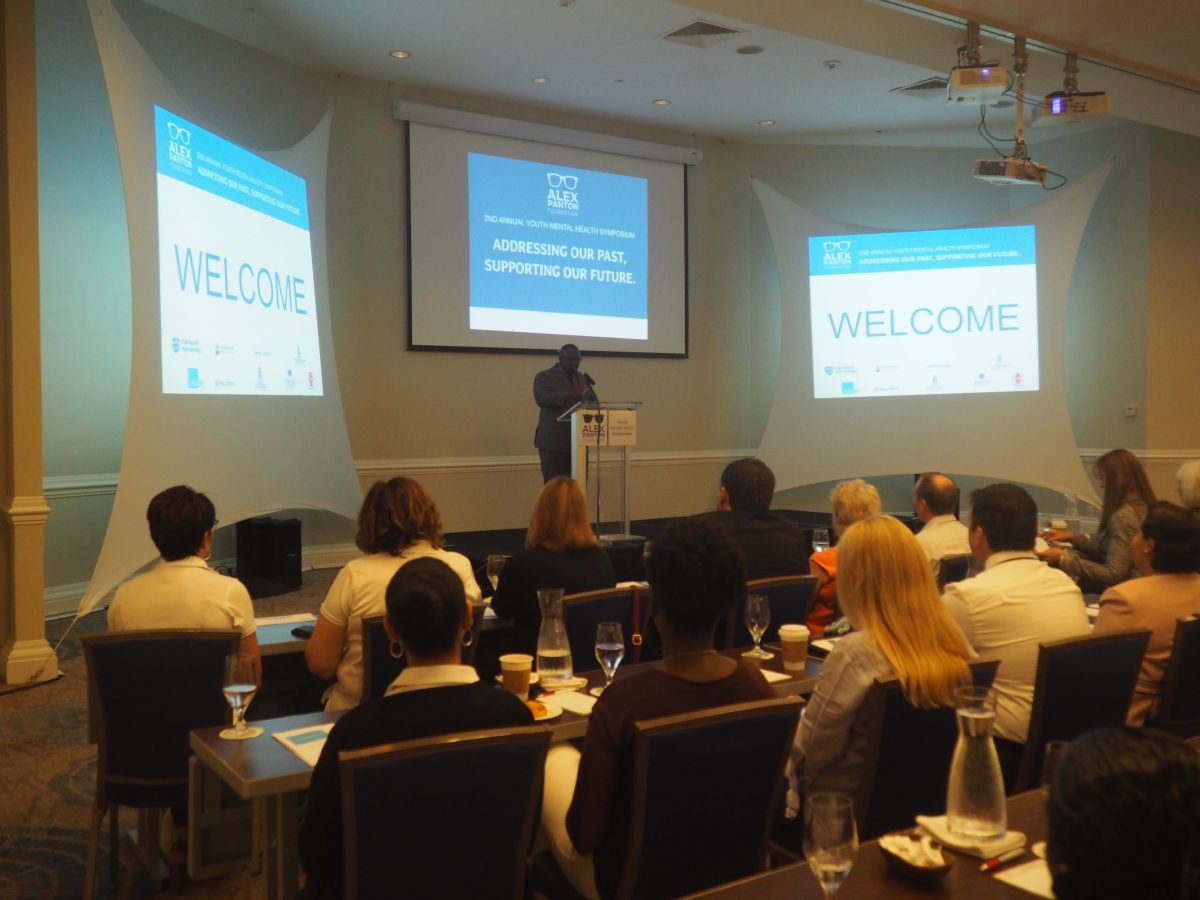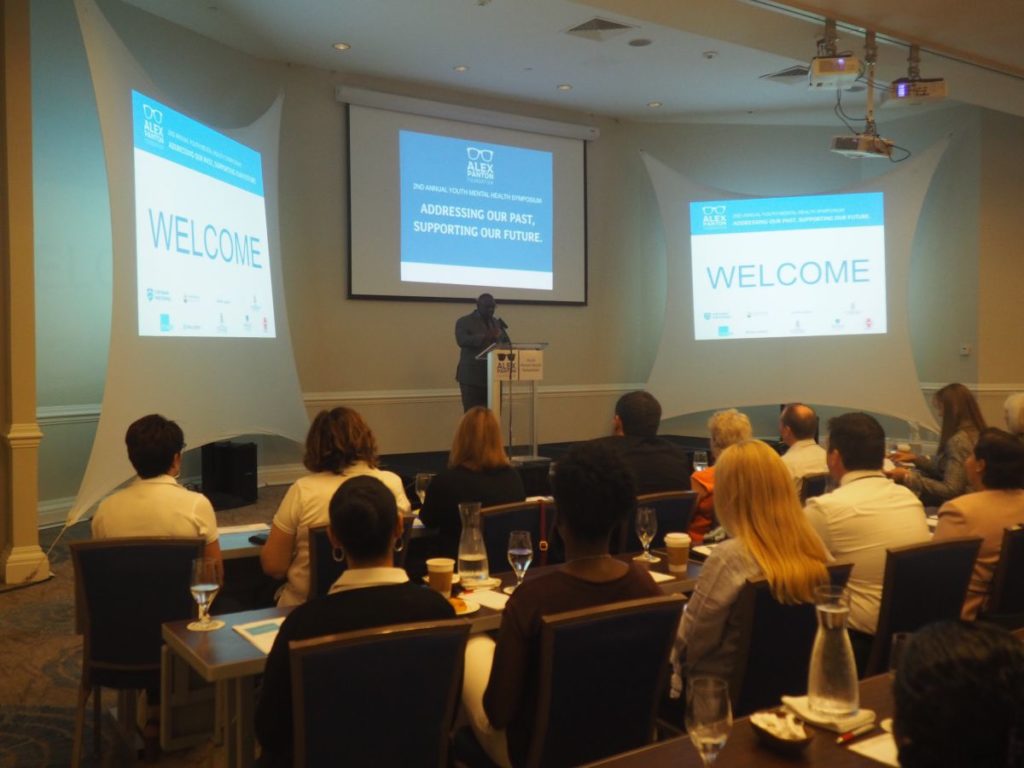(CNS Local Life): Results of the mental-health component of the 2018 Cayman Islands Student Drug Use (CISDUS) biennial survey, which were shared at the recent Youth Mental Health Symposium, pointed to issues concerning students considering suicide, engaging in self-harm and being bullied. More than 200 people attended the second annual symposium, held 23 February and organised by the Alex Panton Foundation, to hear the first nationally representative data on how children and young adults in Cayman are coping with mental-health issues.
The survey, conducted by the National Drug Council (NDC), studied the general mental health of students and sought to explore the risk factors that lead to attempted suicide and suicidal behaviour, which remain the top two causes of death among youth. These factors are self-harm, bullying, violence-related behaviour, childhood abuse and binge drinking, a press release from the foundation stated.
The 2018 CISDUS indicated that 34% of students — one in three — reported that they had seriously considered attempting suicide, representing a 15% increase over the 2007 survey.
Results on risk factors from the 2018 survey:
Self-Harm: 28% of students reported that they have engaged in self-harming behaviour; the number one method of self-harm is cutting, followed by hitting or banging body parts, scratching/pinching, and burning. Students who reported self-harming were 17 times more likely to have attempted suicide.
Bullying: More than half of the students surveyed, 54%, reported being bullied at some time and over 67% reported carrying a weapon in the community or at school. This was reported higher than average in Cayman Brac and Bodden Town. Students who were bullied were much more likely to have attempted suicide, 21% compared to 4%.
Physical and Sexual Abuse: Physical abuse was experienced by 17% of students surveyed with girls (20%) more likely to report this than boys (12%). Sexual abuse was reported by 10% of the students, with girls (16%) more likely to report this than boys (3%). Both physical and sexual abuse serve as risk factors to attempted suicide, increasing the likelihood by four and six times, respectively.
Binge Drinking: The prevalence of binge drinking overall was 20%. Students who reported binge drinking were 1.5 times more likely to have attempted suicide compared to those who had not reported binge drinking.

On the positive side, the foundation said, 92% of students surveyed understood what mental health is, with just more than half the students acknowledging they were taught about mental health in school.
Speaking on the importance of the recent findings, Dr Erica Lam, clinical and education committee member of the foundation, said, “Until now we have been relying on international data to keep us informed on mental health issues.While the international data is still valuable, we now have new localised data which for the first time allows us a more insightful analysis of issues affecting our youth.
“This new data will also assist in planning better youth mental health services in the future that is tailored to the needs of our young people.”
Jane Panton, foundation chairperson, spoke of the survey as well as the recent symposium. “The Alex Panton Foundation has a clear mission, to improve the mental health of our children and young adults in the Cayman Islands,” she said. “This can only be done by acknowledging the issues they are facing and educating our community on services available to help those in our community dealing with mental-health issues.
“The collaboration with the National Drug Council has allowed us to achieve this mission and the symposium gives us the platform to shape the narrative around mental illnesses.”
In his opening remarks to the symposium, Minister for Health Dwayne Seymour said his ministry will be assessing support services for youth.
“This is the first nationally representative data available in the Cayman Islands and it is vitally important to draw comparison between the international data that we have previously relied upon and the recent findings – both in terms of the prevalence of youth mental health issues and the risk factors that lead to them.
“Indeed my ministry is in the process of conducting a needs assessment that will identify current services available within the public and private sector and will highlight gaps which need to be filled in future if we are to properly support our youth.”
Next steps for the Alex Panton Foundation include addressing the recent data and continuing to work with a number of community partners such as the NDC, YMCA, Loud Silent Voices, Ministry of Community Affairs, the Mental Health Commission, and Health Services Authority, as well as international organisations, to help direct future initiatives.
For more information on the Alex Panton Foundation and the symposium go to its website and Facebook page




I wonder if the survey was done in a non-identifiable method or whether these 34 percent can be contacted by qualified case workers to provide personal counseling and interaction. Also I know I run the risk of being vilified and lambasted but has any thought been given to the possibility that some students taking the survey might not have been totally serious enough about the survey to not give misleading information. I say this because 34 percent having thoughts of harming themselves or commiting suicide is huge! If there is no doubt that the questions were clearly understood and answered correctly then this is a crisis and every effort should be made to find these students and get them the help they need immediately.
Unfortunately, I think it’s true. I’ve been hearing about girls cutting themselves lately.
Tragic that our politicians habitually ignore mental health, drug education and rehab budgeting. Gaps?!? It is difficult to reconcile the existence of all of these purported “support agencies” with reports of 50% bullying, outrageous 70% of kids in Bodden Town and Brac walking around with a weapon, and the shocking 30% of kids that are contemplating suicide, double the teen statistical norm:
https://www.childtrends.org/indicators/suicidal-teens
It’s a bit appalling that the National Drug Council neglected to tally the more contemporaneous statistics on cell phone/social media hours, vaping/smoking, marijuana, cocaine, and pill abuse. Are they operating from a playbook from the 1980s?
These aren’t gaps, these are statistical gulfs. We have SERIOUS unaddressed problems that will translate into premature deaths, future crime, law enforcement, healthcare and incarceration expenses. Pay now, or pay later.
Same old, same old discussion….this pisses me off. Lets a take a close look.
(My post is too long and not very concise, but I am just a lay person who sees that nothing was and is being done to help mentally troubled Cayman youth. Empty talks mostly.)
February 24, 2019, second annual Mental Health Symposium.
• Dr. Erica Lam, the clinical consultant for the Alex Panton Foundation, and Brenda Watson and Luisa McLaughlin of the National Drugs Council…gave a presentation on the PAST OF MENTAL HEALTH TREATMENT in the Cayman Islands.
My question is: WHY? WHAT WAS THE PRACTICAL PURPOSE OF THIS PRESENTATION?
• Kevin Ashworth, an inspector with the Royal Cayman Islands Police Service Family Support Unit….spoke about the connection between delinquency and mental illness.
My question is: DON’T WE NOW THAT ALREADY?
• Dr. Marc Lockhart, the chairman of the Mental Health Commission…said that “Cayman has met many challenges but still has to face many more in the future.”
My comment: REALLY? THANKS FOR REPEATING THE OBVIOUS!
“But we still have a long way to go.”
My comment: MAY BE WHAT YOU ARE DOING IS NOT WORKING OR YOU DON’T UNDERSTAND THE ROOT OF THE PROBLEM?
• Paulinda Mendoza-Williams, director of the Department of Children and Family Services…”Child abuse, she said, is one of the largest local factors that causes children to suffer from mental abuse.”
My comment: WHY REPEATING THE OBVIOUS?
“we want to look at what’s been happening, but more so what are we are doing as a community”
My comment: HOW MUCH LONGER ARE YOU GOING TO LOOK INTO WHAT IS HAPPENING AND WHAT YOU ARE DOING?
“UNSPEAKABLE” DOCUMENTARY CAME OUT WHEN??? IN 2014?
• Terry Delaney, a private practice psychologist, drew a distinction between the brain and the mind. One is a physical organ, he said, and the other is a manifestation of people’s emotions and experiences”
My comment: WHAT???? WAS HE TALKING TO A GROUP OF PROFESSIONALS OR PRESCHOOLERS? I WOULD LOVE TO SEE HIS CREDENTIALS.
“Physically, emotionally, spiritually, sexually. In every way of life, they’re going through massive change.”
My comment: DOESN’T EVERY LAY PERSON KNOW THAT?
Survey statistics were revealed, they spoke on the importance of the recent findings. “Until now we have been relying on international data to keep us informed on mental health issues. While the international data is still valuable, we now have new localised data which for the first time allows us a more insightful analysis of issues affecting our youth.”
PARDON ME, BUT I HAVE TO COMMENT: So mental health professionals, had no clue on mental health issues and had to rely on international data??????? Now they have new local data “for the first time” that allows more ANALYSYS??? Do they say: We had no clue about mental health and had rely on international DATA, now we still have no clue and have to rely on new localised data and ANALYZE, ANALYZE, ANALYSE…. this is all we can do?
So, the group of 200 people got together to repeat the obvious, throw some numbers and pat each other on the back?
DID THEY TALK ABOUT THE CAUSES? DID THEY TALK ABOUT PREVENTION? DID THEY TALK ABOUT REAL “TREATMENTS” WHICH ARE NOT PILLS?
What practical support and assistance mentally troubled Cayman Youth would receive after this Symposium? What practical advices parents of the mentally troubled youth have received? What widespread measures could (would be) be taken immediately to prevent youth mental issues?
Now let me share a few thoughts with you about possible causes of mental health issues among youth and what could be done immediately to mitigate the problem.
In 1874 when the light bulb was invented suicide was so rare it was not even listed as a cause of death in the TOP 100.
2018: Suicide = USA 10th leading cause of death.
Now look at these studies:
• “ The question is the extent to which circadian disruption compromises human health, and can account for a portion of the modern pandemics of breast and prostate cancers, obesity, diabetes and depression. As societies modernize (i.e. electrify) these conditions increase in prevalence. There are a number of promising leads on putative mechanisms, and epidemiological findings supporting an aetiologic role for electric lighting in disease causation. “(Electric light, particularly at night, disrupts human circadian rhythmicity: is that a problem? Philos Trans R Soc Lond B Biol Sciv.370(1667); 2015 May 5PMC4375361)
* “Abnormalities in circadian rhythms have been reported in people with mood disorders” (Circadian rhythms and psychiatric profiles in young adults with unipolar depressive disorders,Journal ListTransl Psychiatryv.8; 2018PMC6177460).
* ”Evidence is mounting for a relationship between BPD [bipolar disorder] and clock genes.” (The role of circadian clock genes in mental disorders Dialogues Clin Neurosci. 2007 Sep; 9(3): 333–342.)
Circadian rhythms are variations in physiology and behaviour that recur every 24-hours, such as the sleep-wake cycle and daily patterns of hormone release. They are fundamental for maintaining health in humans, and integrity of circadian rhythms is particularly important for mental health and wellbeing.
Disruption of circadian rhythms increases risk of depression and bipolar disorder, associated with low subjective ratings of happiness, with higher risk of reporting loneliness.
Practical and easy solution #1.
• No artificial lighting after sunset or replacing LED lights with old fashioned incandescent. Limit (better eliminate) kids screen times after sunset, or use blue light blocking filters and glasses.
Practical and easy solution #2.
• AM sunlight exposure . The critical importance of AM sunlight exposure through retina. Why? AM light has perfect blend of red and blue light and just a touch of purple UV-A light to make melatonin. The UV-A light is also what begins to lower cortisol as melatonin builds. Early AM sunlight releases an opiate.
The above covers one possible reason for increase in mental health issues in modern time. Keep in mind that myelin acts as insulation for millions of brain cells, allowing for swift and efficient transmission of signals across brain regions, so the younger the child, the more damage artificial light inflicts on his brain, because that protective coating has not completely formed yet.
The second reason is lack of coping skills.
• “The skills needed to cope with stressful events and chronic adversity and to regulate emotions, including emotions that arise in response to stress, are fundamental and pervasive aspects of development that emerge over the course of childhood, adolescence, and young adulthood”
(Coping and Emotion Regulation from Childhood to Early Adulthood: Points of Convergence and Divergence, HHS Author ManuscriptsPMC4038902)
Practical solution: Teaching coping skills to manage bad feelings as early as possible.
Social media and online communication is believed to be having adverse effect on social skills and communication among adolescents.
Cayman can follow countries that banned mobiles and gadgets at schools.
* United Kingdom Bans Mobile Phones
* Australia bans Mobiles at School
““While smartphones connect us to the world in ways never imagined just a decade ago, they raise issues that previous generations have not had to deal with. …. also create other problems. From screen time, to cyberbullying and social media, smartphones have generated concerns for parents, teachers and students. “
• Israel Banned Mobiles at Schools “This time, it was not for students only but for teaching and educational staff as well! The ban is active during the teaching hours.”
• France passed a law in 2015 banning WiFi from all nursery schools. In addition to that, the law states that Wi-Fi must be turned off in all elementary schools when it’s not in use. A wired connection, if possible, is preferred. When it comes to cell phones in France, all advertisements must recommend headsets to reduce the phones radiation exposure to the brain. Furthermore, advertisements directing cell phone use towards young children are banned.